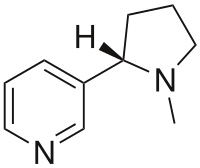
Photo from wikipedia
OBJECTIVE The objective of this study is to evaluate the feasibility and tolerability of new bacteriological samples to diagnose tuberculosis (TB) in HIV-infected children. METHOD AND PATIENTS HIV1-infected children with… Click to show full abstract
OBJECTIVE The objective of this study is to evaluate the feasibility and tolerability of new bacteriological samples to diagnose tuberculosis (TB) in HIV-infected children. METHOD AND PATIENTS HIV1-infected children with suspicion of TB in Universitary Hospital Sourô Sanon (Burkina Faso) were included in a prospective cohort study. Children underwent three gastric aspirates (GA) if aged <4 years; two GA, one string test (ST) if aged 4-9 years and three sputum, one ST if aged 10-13 years. All children underwent one nasopharyngeal aspirate (NPA) and one stool sample. To assess feasibility and tolerability of procedures, adverse events were identified and pain was rated on different scales. Samples were tested by microscopy, culture, GeneXpert® (Xpert®). RESULTS Sixty-three patients were included. Mean age was 8.92 years, 52.38% were females. Ninety-five GA, 67 sputum, 62 NPA, 60 stool and 55 ST had been performed. During sampling, the main adverse events were cough at 68/95 GA and 48/62 NPA; sneeze at 50/95 GA and 38/62 NPA and vomiting at 4/55 ST. On the behavioral scale, the average pain score during collection was 6.38/10 for GA; 7.70/10 for NPA and 1.03/10 for ST. Of the 31 cases of TB, bacteriological confirmation was made in 12 patients. CONCLUSION ST, stool is well-tolerated alternatives specimens for diagnosing TB in children. NPA has a poor feasibility and tolerability in children.
Journal Title: Journal of tropical pediatrics
Year Published: 2021
Link to full text (if available)
Share on Social Media: Sign Up to like & get
recommendations!